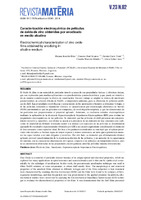Caracterización electroquímica de películas de óxido de zinc obtenidas por anodizado en medio alcalino
Electrochemical characterization of zinc oxide films obtained by anodizing in alkaline medium

Date
2018-07-19Author
Díaz, Daiana Jennifer
Kramer, Gustavo Raúl
Traid, Hernán Darío
Méndez, Claudia Marcela
Ares, Alicia Esther
Metadata
Show full item recordAbstract
El óxido de Zinc es un material de particular interés a causa de sus propiedades ópticas y eléctricas únicas, que son exploradas para muchas aplicaciones en optoelectrónica y nanoelectrónica; y que puede ser sintetizado de manera económica por la técnica de anodización. En este trabajo se empleó la técnica de anodizado potenciostático en solución diluida de NaOH, a temperatura ambiente, para la obtención de películas anódicas de ZnO. Las propiedades morfológicas y estructurales de los anodizados obtenidos a diferentes voltajes, y de las películas sometidas a tratamiento térmico, se caracterizaron por microscopía electrónica de barrido (SEM) encontrándose que las películas son compactas, de morfología heterogénea, y que las dimensiones de las partículas son proporcionales al potencial aplicado. Asimismo, se realizaron estudios electroquímicos mediante la aplicación de la técnica de Espectroscopía de Impedancia Electroquímica (EIS) para evaluar las propiedades electroquímicas de las películas. Se demostró que las películas de ZnO presentan un comportamiento resistivo y capacitivo, este último se asocia a la presencia de un elemento de fase constante con coeficiente de identidad (n) definido levemente menor a la unidad. Los espesores de las películas se determinaron ajustando los resultados experimentales obtenidos por EIS a un circuito equivalente considerando el elemento de fase constante como capacitor ideal. En base a los parámetros analizados se concluyó que al aplicar potenciales más elevados se forman capas de mayor espesor y menor resistencia, en tanto que a potenciales menores las capas tienden a ser más delgadas y resistivas. Por otro lado, se demostró que el tratamiento térmico aplicado provocó una disminución de la resistencia eléctrica de las películas, y un aumento de la capacitancia del sistema, con la consecuente disminución del espesor, respecto a las películas sin tratamiento térmico, pero no se encontraron diferencias en las propiedades electroquímicas entre las películas tratadas térmicamente. Zinc Oxide is a material of particular interest because of its unique optical and electrical properties, which are explored for many applications in optoelectronics and nanoelectronics; and it that can be synthesized economically by the technique of anodization. In this work, the potentiostatic anodization technique was used in dilute NaOH solution, at room temperature, to obtain ZnO anodic films. The morphological and structural properties of the anodized films obtained at different voltages and of the films subjected to heat treatment were characterized by scanning electron microscopy (SEM) and the films were found to be compact, of heterogeneous morphology, and that the particle size was proportional to the applied potential. In addition, electrochemical studies were carried out by applying the Electrochemical Impedance Spectroscopy (EIS) technique to evaluate the electrochemical properties of the films. It was demonstrated that the ZnO films presented a resistive and capacitive behavior, the latter being associated to the presence of a constant phase element with identity coefficient (n) defined slightly lower than unity. The thicknesses of the films were determined by adjusting the experimental results obtained by EIS to an equivalent circuit considering the constant phase element as an ideal capacitor. Based on the parameters analyzed it was concluded that larger layers were applied with greater thickness and less resistance, while at lower potentials the layers tended to be thinner and resistive. On the other hand, it was demonstrated that the applied heat treatment caused a decrease in the electrical resistance of the films, and an increase in the capacitance of the system, with its consequent decrease in thickness, with respect to films without heat treatment, but no differences were found in the electrochemical properties between the thermally treated films.
Collections
The following license files are associated with this item:



